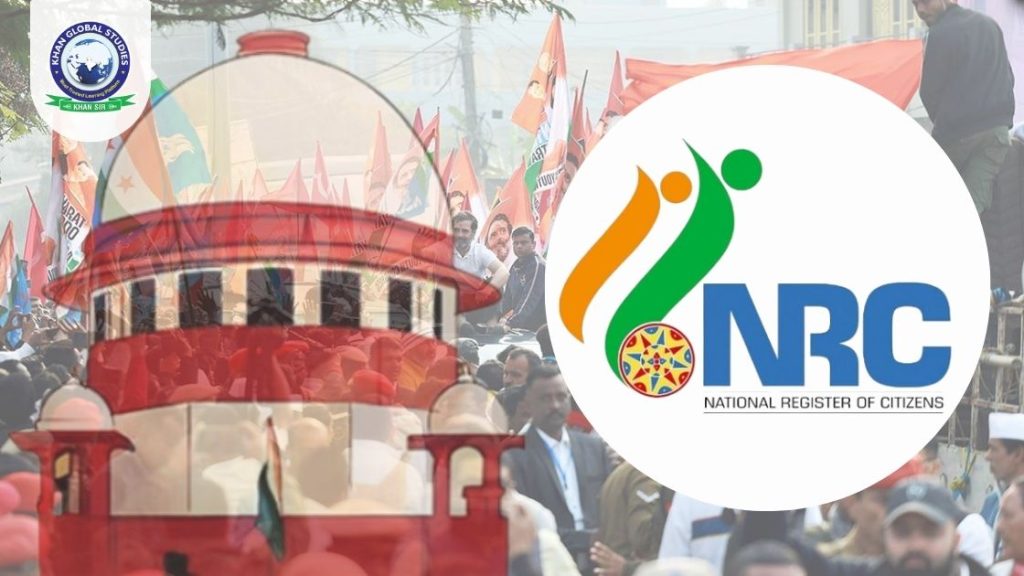The name of the National Register of Citizens (NRC) is revolving in the mind of every person all over India. Many people want to know what documents they need to show to prove their citizenship. Let us know in detail in this article which documents will be sufficient to be included in the National Citizenship Register.
What is the National Register of Citizens (NRC)?
NRC in Assam was first prepared in 1951 to know the citizens, their houses and their properties. The All Assam Students Union has raised the demand to update the NRC in the state since 1975.
The purpose of the Assam Accord (1985) was to remove the names of Bangladeshi refugees who entered the state at midnight on 24 March 1971, the day before Bangladesh’s independence, from the electoral rolls and deport them back to Bangladesh.
The population of Assam is about 33 million. It is the only state which has updated the NRC. The process of NRC started in 2013 on the orders of the Supreme Court.
History of NRC
The National Register of Citizens (NRC), 1951, compiles a register for each village based on the 1951 census, listing in chronological order the houses or properties and the number of people living in each house or village. The authorities printed the NRC only once in 1951.
The authorities first submitted the NRC after the 1951 census of India, and Assam updated this NRC to include the names of people and their relatives effectively listed in the 1951 NRC late on the night of 24 March 1971, or when Till then he did not follow the discretionary role.
NRC Eligibility Criteria
To be eligible for NRC, a person must fulfill the following qualifications:
- Any person whose name appeared in the NRC of 1972 or any electoral roll up to 24 March 1971 (noon) and their relatives.
- Central government rules do not consider people listed with the Foreigners Registration Regional Officer (FRRO) as illegal travellers or outsiders by any authority.
- Any person who came to Assam on or after January 1, 1966, and before March 25, 1971, is eligible.
- Native Assamese residents and their children and relatives qualify as Indian citizens if they can definitively prove their citizenship through the enrollment process.
- As per central government rules, people registered with the Foreigners Registration Regional Officer (FRRO) are not considered by any authority as illegal migrants or outsiders.
- Any person who came to Assam on or after January 1, 1966, and before March 25, 1971, is eligible.
- Persons who are native Assamese residents and their children and relatives who are residents of India, if the nominating authority determines their citizenship.
- For those who can provide any records, the document lists all legal citizens who surrendered by noon on 24 March 1971.
Impact of NRC
- The fresh NRC will put an end to speculations about the actual number of illegal immigrants in Assam and the country.
- This will give a real dataset for important discussions and execution of aligned approach measures.
- The distribution of fresh NRC prevents future Bangladeshi migrants from entering Assam illegally.
- Illegal travellers may find it challenging to obtain an Indian Character Record and participate in the privileges in general, and this would benefit Indian residents.
- Before the distribution of the draft NRC, it was felt that staying in Assam without sufficient documentation could lead to extradition and detention.
- With the proposal of a pan-India NRC (National Register of Citizens), there were inevitable fights against the Citizenship Amendment Act (CAA).
Objectives of the National Citizenship Register
The basic objective of the NRC update in Assam is to identify foreign nationals and Indian citizens in the state. Organizations like All Assam Students Union and other citizens of Assam accuse Bangladeshi immigrants of usurping their rights and indulging in criminal activities in the state. Therefore, they argue that these refugees should return to their countries.
Data about NRC:
The government has allocated around Rs 1200 crore for the NRC process, which involves 55,000 government officials and 64.4 million documents are being scrutinised.
Who is a citizen of Assam?
People living in Assam before 25 March 1971 are considered citizens of Assam. People living in this state had to submit any one of the documents given in List A to establish a connection with their ancestors from Assam. Apart from this, the documents given in the second list B will have to be presented, so that it can be considered that your ancestors were from Assam.
How has NRC been updated?
If anyone wants to see his name in the selected list of citizens of Assam, he has to submit any one of the documents given in ‘List A’ along with the NRC form to prove his residence in the state before March 25, 1971.
If someone claims that his ancestors are natives of Assam, hence he is also a resident of Assam, then he has to submit the NRC form along with any one of the documents mentioned in ‘List B’.
The main documents sought in ‘List A’ are as follows;
- Voter list till 25 March 1971
- NRC of 1951
- Rent and Tenancy Records
- Citizenship Certificate
- Permanent Residence Certificate
- Passport
- Bank or LIC Document
- Permanent Residence Certificate
- Educational certificates and court order records
- Refugee Registration Certificate
The main documents included in List B include;
- Land Documents
- Board or University Certificate
- Birth Certificate
- Bank/LIC/Post Office Records
- Ration Card
- Name in the voter list
- Other legally acceptable documents
- The certificate is given by a Circle Officer or Gram Panchayat Secretary for married women.
The final NRC list released
The final NRC list in Assam was released on 31 August 2019. 19,06,657 people were not included in this list whereas 3.11 crore people have been included in this citizenship list. A total of 3.29 crore people had applied in this list.
Does exclusion from the list mean being declared a foreigner?
No; Those excluded from the list can apply to Foreigners Tribunals which are quasi-judicial bodies under the 1964 law. These people can appeal to these tribunals within 120 days of the release of the list.
If the Foreigners Tribunal declares someone a foreigner, he can appeal to higher courts. The court can declare anyone a foreigner and arrest him and keep him in a detention center. As of July 2019, authorities have declared 1,17,164 persons as foreigners, of whom 1,145 are in custody.




